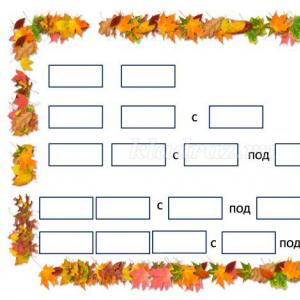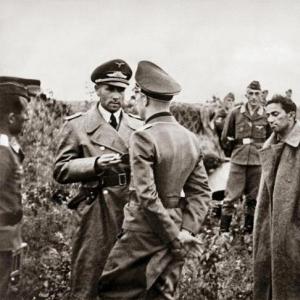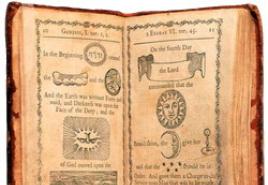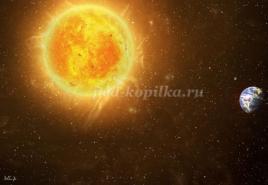The lexical theme is late autumn in the middle group. Late fall
Didactic material for consolidation on the lexical topic: "Autumn".
Meshcheryakova Svetlana Gennadievna, teacher - speech therapist MKOU Sh-I No. 8, Gremyachinsk, Perm Territory.Target: Generalization of students' knowledge about the season - autumn.
Tasks: Develop coherent speech, communication skills, auditory and visual attention, thinking;
Improve the grammatical structure of speech;
Cultivate curiosity.
Description:
It is known that good command of speech plays a significant role not only in everyday life, but also in the professional activity of a person. A more pleasant impression on others is made by someone who is an interesting interlocutor, who can express his thoughts effectively and intelligibly.
Good command of the native language, speech is an art that needs to be learned.
Why is it necessary to develop oral speech?
- Be able to communicate with different people in different situations
- Express your thoughts and feelings
- Speak beautifully, correctly and pleasantly for the listeners.
Speech serves as a source of knowledge about the world around us, a means of communication and mutual understanding. In this regard, the ability of children to use speech is of great importance.
Every child needs to communicate. The need for communication is one of the most important in human life. Entering into relations with the world around us, we communicate information about ourselves, in return we receive the information we are interested in, analyze it and plan our activities based on this analysis. And, of course, children want to be understood. Children often have difficulty describing people, objects, phenomena. Even despite a sufficient vocabulary, most children do not know how to speak correctly, it is difficult for them to formulate their thoughts, they cannot fully participate in a conversation, conduct a dialogue.
The formation of coherent speech is the main task of speech education. Good speech is an important condition for the development of a child's personality.
Didactic game- an excellent tool for learning and development, used in the assimilation of any program material. Specially selected games and exercises make it possible to favorably influence all components of speech. In the game, the child gets the opportunity to enrich and consolidate the vocabulary, form grammatical categories, develop coherent speech, expand knowledge about the world around him, develop verbal creativity, and develop communication skills. The proposed tasks are aimed at consolidating the material on the lexical topic: "Autumn". This is a kind of homework that is interesting to do with children after a speech therapy lesson at home, on a walk.
Material will be useful to educators, primary school teachers, parents, speech therapists.
Exercise:
"Read, add, make sentences."

Exercise:
"Put the words in order, make the correct sentence."
Boots, rubber boots, shoes. (Rubber boots are shoes)

Exercise:
"Favorite Poems"
Listen to the poem. Find offers. Read expressively.
To let children feel the beauty of a poetic word, an adult himself must feel it and be able to convey it in his performance. You can not read the work monotonously, inexpressively.
Cowberries ripen.
The days got colder
And from the bird's cry
The heart is only sadder.
Flocks of birds fly away
Away beyond the blue sea.
All the trees are shining
In multi-colored attire.
The sun laughs less
There is no incense in flowers.
Autumn will wake up soon
And cry awake.

Covers a golden leaf
Wet ground in the forest...
I boldly trample with my foot
Outer forest beauty.
Cheeks burn with cold
I like to run in the forest,
Hear the branches crack
Rake the leaves with your foot! ..
(A.N. Maikov)

Exercise:
Read the poem. Come up with a name.


Exercise:
"Clarify the signs"
Tell me what is typical for each autumn month? How is autumn different from summer?

Adjective agreement with nouns:
Exercise: Choose epithets for the words: sun, sky, day, weather, trees, grass, animals, birds, insects.


Exercise:
Find antonyms for the words: warm - cold, cloudy day - sunny day, dry - wet, long - short.
Exercise:
"Speak a tongue twister."
First, say the tongue twister out loud twice slowly. Now to yourself several times - at first slowly, then faster and faster. Learn to quickly pronounce tongue twisters out loud.
“All the maples have become red,
And no one teases:
Since everyone is red
Who cares!"

Exercise:
"Learning to Answer Questions"
Depending on what task you set for the child, ask for such an answer: full or short. After reading the text, the answers can be full of content. The question should be constructed correctly, clearly, so that the child is not distracted by extraneous details.Listen to the story. Tell me, what time of year are you talking about?
Look at the pictures, which one matches the story?
It is important that the text read by an adult be an example of the correct literary construction of a sentence, be bright, expressive. Autumn comes after summer. Gradually, the days become more and more cloudy, the sun shines less and less. The sky is covered with gray clouds. It often rains - long, drizzling. The leaves on the trees turn yellow and fall off. The cold wind rips the leaves from the branches of the trees, and they fall to the ground, covering it with a golden carpet. The grass is withering. The street is damp and slushy. The birds no longer sing. They hide from the rain, gather in flocks and fly away to warmer climes. You won't go outside without an umbrella, you'll get wet. Yes, and cold without a jacket and boots.

Multicolored boats.
I came to the pond. How many colorful boats are on the pond today: yellow, red, orange! They all came here by air. A boat will fly in, land on the water, and immediately float away. Many more will arrive today, and tomorrow, and the day after tomorrow. And then the boats run out. And the pond will freeze.
(D.N. Kaigorodov)
Tell me what kind of boats float on the pond. What time of year are these boats available?
Color this picture and write a story about it.



Share your impressions of autumn. Ask, how do you feel about autumn? Begin the story with these words:
I AM I love autumn because...
to me I don't like autumn because...


Make a story according to the plan: "Knowledge Day!"

Exercise: What autumn gave us.
Words are helpers: garden, fruits, vegetables, garden, cleaning, harvest, mushrooms, baskets, forest, collect, ripen, harvest.


The game:"What grows in the garden?"
Remember what grows in the garden. What grows in the garden? Look at the pictures, first name all the vegetables, then all the berries, and finally all the fruits.
Answer the questions and explain why it is possible to give more than one correct answer to the same question.


The game:"I cook myself"
Show and name the vegetables from which borscht soup is cooked, and fruits for compote.
We will cook borscht from…
We will cook compote from ...


The game:"I'm inventing a color"
The names of some colors come from the names of words - objects. Let's come up with the names of the colors together.
Lettuce (what color?) - lettuce.
Lingonberry (what color?) - lingonberry.
Beets (what color?) - beet.
Walnut (what color?) - walnut.
Carrots (what color?) - carrot.
Plum (what color?) - plum.
The game:"What are the juices"
What are these juices called?
Apple juice is apple juice.
Grape juice is grape juice.
Carrot juice - carrot juice.
Tomato juice is tomato juice.
Cucumber juice is cucumber juice.
Plum juice is plum juice.
Cabbage juice is cabbage juice.
Potato juice is potato juice.
Cranberry juice...
Pear juice...
Monday:
Morning: morning exercises.
Ecological fairy tale - conversation "Adventures of the wind". Purpose: to concretize and consolidate knowledge about the wind.
P / and "Catching with the wind."
D / and "Harvest". Purpose: to develop coordination of words with movements.
Physical break. Ex. "Bird before takeoff". (Zhuravleva, 63).
Walk:
Watching the sky and clouds. Purpose: to continue to consolidate knowledge about the phenomena of inanimate nature; clarify the concept of "Cloud".
D / and the game "What sky?". Purpose: to exercise in the selection of relative adjectives.
P / and "The sea is worried." Purpose: to develop imagination, the ability to express a conceived image in motion.
Ind. zan. in physio with Vika and Yaroslav. Exercise: jumping into and out of a circle made of leaves.
Games for children.
Evening: gymnastics after sleep.
Reading and discussion of the story of O. Grigorieva "Waiting for winter". (set of illustrations).
P / and "The rain is prickly." ("The Magic Tree", 17).
Collective work "How animals prepare for winter."
Studio "Synthesis".
Tuesday:
Morning: morning exercises.
Conversation on the topic: "What did you see on the way to kindergarten?".
D / and "Whose supplies?". Purpose: to consolidate knowledge about preparing animals for winter.
P / and "Squirrel chooses a hollow." Purpose: to introduce the Finnish outdoor game; interest children. (Kartushina, 19).
Relaxation exercise. "Autumn".
Walk: Watching rainy weather. Purpose: to introduce the most typical signs of late autumn - rainy weather; clarify the name and purpose of clothing.
D / and "Who lives where?". Purpose: to consolidate the ability to group plants according to their structure (shrubs, trees).
P / and "Stop". Purpose: to train children in the ability to perform movements in accordance with the text.
Ind. zan. in physio with Veronica and Savva. Consolidate walking with a wide step.
Work on the site: continue to remove fallen leaves and branches.
Wellness run.
Evening: Gymnastics is a wake up call. (Kartushina, 29).
Reading and discussion of the story of A.I.
Strizhev "View of winter".
Communication game "Echo". (Kartushina, 18).
P / and "Such a different rain."
(Alyabyeva, 52).
Rhythmic gymnastics.
Wednesday:
Morning: morning exercises.
Conversation on the topic: "What autumn gave us." Purpose: to consolidate knowledge about fruits, vegetables, mushrooms.
D / and "Fruits and seeds".
Self-massage "Prickly hedgehog".
(with massage balls).
P / and "Drops of rain". (Comp. Zan. St. gr., 35).
Psychological study "My mood".
Walk. Observation of the connection of phenomena in nature. Purpose: to continue to develop the ability to establish cause-and-effect relationships in nature.
Ind. zan. on the development of speech with David and Olya. D / and "Name the bird with the right sound."
Experimental activity. Feather experience. Purpose: to find out which feathers fly better in the air, why?
P / and "Run to the tree." Purpose: to fix the names of the trees.
Games for children.
Evening:
hardening procedures. Walking on corrective mats.
"Autumn Flies". The story on the theme of the poem by E. Trutneva "Autumn".
Dynamic pause "Autumn Forest". (Comp. Zan. St. gr., 55).
Rhythmic gymnastics.
Thursday:
Morning: morning exercises.
Conversation on the topic: “Why is November called “black-thrope?”.
D / and "Pick up a sign." Purpose: to exercise in the selection of adjectives.
P / and "Hares and the wolf". Purpose: to exercise in running on a signal: to develop dexterity, attention, courage.
Breathing exercises: ex. "Wind". (Zhuravleva, 87).
Walk:
Observation of the first frosts. Purpose: to continue acquaintance with the diversity of natural phenomena in late autumn.
Introduce the new mobile game "Potato". Purpose: to exercise the ability to throw the ball to each other. (Kobzeva, 83).
Game "Smells of autumn".
Experimental activity. Experience "Transparency of ice".
Wellness run.
Evening:
Tempering procedures: washing the face and hands with cool water.
Reading x / l. Ecological fairy tale "The Legend of the Sun". ("Little Russians").
Registration of the "Red Book of the Samara Region".
C / r game "Journey to the forest."
Studio "Rainbow".
Friday:
Morning: morning exercises.
Conversation on the topic "Good deeds in the fall." Purpose: to cultivate a respectful attitude to work, a desire to help nature.
D / and "Whose tail, whose head?". Purpose: to consolidate knowledge of the appearance of birds and animals.
P / and "From ice to ice." Purpose: to develop coordination of movements; sense of balance, dexterity.
Tea minute.
Walk.
Weather observation. Purpose: to consolidate ideas about the last period of autumn, its features.
P / and "Don't get your feet wet." Purpose: to develop agility, reaction to a signal, running speed.
Ind. zan. in physics with Ilya and Masha. Fix walking in a limited area.
Experimental activity. Experience "Dependence of the state of water on temperature." Purpose: to continue to acquaint children with the properties of water.
Games for children.
Evening:
Gymnastics is a wake up call.
Exercises for the development of small muscles of the fingers: “Path to the forest” (laying out a path from seeds); "Draw how the leaf falls" (drawing straight, wavy, spiral lines).
Composition of the story "I want to protect ...". Purpose: to form a coherent speech, the ability to compose a story about any representative of nature.
Evening of poetry "Goodbye, autumn." (reading poems by Russian poets dedicated to autumn).
Lexical theme "Autumn"
COGNITIVE PART
Children should know:
- the names of the autumn months;
- the main signs of autumn;
- what happens to the trees, how the grass has changed, the meaning of the word "falling leaves";
What do animals and birds do in autumn?
- what people do
- what gifts did autumn bring to people;
- why they say "golden" about autumn.
Children's vocabulary expansion:
titles: autumn, september, october, november, months, falling leaves, rains, clouds, puddles, wind, fog, dampness, bad weather, freshness, nature, harvest, garden, kitchen garden, fruits, vegetables, stocks, trees, leaves, forest, birds , animals, slush, winter, weather, wilting, haze, sky, sun, people, clothes, umbrella;
signs: early, late, autumn, dull, sad, golden, farewell, foggy, distant, difficult, rich, long, short, frequent, rare, gloomy, rainy, rainy, damp, crimson, naked, fading, sad, marvelous, beautiful , lush, migratory, wintering;
actions: fly, rustle, fall, rustle, crumble, come, come, frown, say goodbye, fly away, coo, clean, pluck, collect, dig, dress, prepare, fade, turn yellow, dry, drizzle.
DIDACTIC GAMES AND EXERCISES
The grammatical structure of speech
Formation of nouns with diminutive suffixes
"Call it sweetly"
Rain - rain, rain, sun - sun,
puddle - puddle, tree - tree,
wind - breeze, leaf - leaf, leaf, leaf,
cloud - cloud, forest - forest,
garden - garden, bird - bird.
Plural formation of nouns in the genitive case
"One - many"
Month - months, tree - trees,
rain - rain, fruit - fruit,
puddle - puddles, vegetable - vegetables,
harvest - harvests, leaves - leaves,
garden - gardens, bird - birds,
garden - gardens, slush - slush,
umbrella - umbrellas, forest - forests.
Noun and adjective agreement "Say with the word "autumn""
The sky (what?) - autumn,
wind (what?) - autumn,
alley (what?) - autumn.
The exercise is continued with the words: sun, cloud, rain, flowers, forest, weather, boots, day, morning, coat.
Formation of quality adjectives “Tell me what the weather is like?”
What is the weather like in autumn when it rains? - rainy
... the wind is blowing - windy;
if it's cold outside, what's the weather like? - cold;
if it's cloudy, it's cloudy
... damp - raw,
... gloomy - gloomy,
... sunny - sunny,
... clear - clear.
Formation of the plural of verbs, nouns and adjectives "One - many"
Autumn day has come - autumn days have come
yellow leaves on the tree - yellow leaves on the trees,
a dark cloud floats - dark clouds float,
there is a big tree - there are big trees,
it's cold raining - it's cold raining
a strong wind is blowing - strong winds are blowing,
a warm jacket hangs - warm jackets hang,
a flock of birds flies - flocks of birds fly.
Lexical structure of speech
Retelling of the story "Autumn"
After summer comes autumn. The leaves on the trees, bushes turn yellow, redden, fall off. The sky is often covered with clouds, it rains. They are not the same as in summer - warm and strong, but small and cold.
At the beginning of autumn there are still many warm days, the sun is still warm, there are many flowers in the flower beds. This is golden autumn. It's beautiful all around. By the end of autumn there are few sunny days, the sun heats badly, it becomes cold. The water freezes from the cold, sometimes snow falls, but it melts from the heat of the day. Almost all the trees are bare, the flowers have withered. It's getting cold, so the birds fly south. These are migratory birds. Animals are preparing for winter too. Some go to bed for the whole winter, having made reserves of fat over the summer (bear, hedgehog, badger), others change their fur coat to a warmer one (hare, squirrel), many animals store food for the winter (squirrels, mice).
Insects hide in old stumps, snags, climb under the bark. The forest is quiet and deserted.
In the autumn they harvest: vegetables in the garden, fruits in the garden.
People dress warmer: they put on jackets, hats, warm pants, sweaters, cover their heads with scarves, put on boots, shoes.
Antonym search for “Say the other way around”
Early autumn - late autumn
happy day - sad day,
sunny day - cloudy day,
white cloud - black cloud
... cold - hot,
... good - bad.
Search for a relevant concept
"I will start and you will finish"
People are dressed in autumn, (in what?) - ...;
schoolchildren go with portfolios (where?) - ...;
the leaves on the trees became (what?) - ...;
flowers in the flower beds (what did they do?) - ...;
birds fly away (where?) - ...;
animals do for the winter (what?) - ...;
people gather in forests, gardens, fields and orchards (what?) - ....
Building a monologue
"Tell me about autumn according to the plan":
1) when autumn comes;
2) autumn months;
3) signs of autumn in nature;
4) the beauty of golden autumn;
5) what do birds and animals do in autumn;
6) human labor in the autumn period;
7) autumn clothes.
Search for factual errors
"Correct mistakes"
Summer has passed and autumn has come. Cold winds blew, the flowers withered, leaves blossomed on the trees. The animals began to stock up for the winter: a hedgehog - honey, a squirrel - nuts, a bear - cabbage, a fox - apples. Birds have come from the south.
The children put on panama hats and went out for a walk in the yard. They played hide-and-seek, made a snowman and fed the crumbs to the birds.
MINUTE REST
Autumn has come, the flowers have dried up,
And look sadly bare bushes.
The grass withers and turns yellow in the meadows.
Only the winter turns green in the fields.
A cloud covers the sky, the sun does not shine.
The wind is howling in the field, the rain is drizzling.
The waters rustled a fast stream.
The birds have flown to warmer climes.
A.N. Pleshcheev
Solve riddles!
In the morning we go to the yard -
Leaves fall like rain
Rustle underfoot
And fly, fly, fly. (Autumn.)
Dry - wedge, wet - pancake. (Umbrella.)
They often call me, they wait,
And when I come, they hide from me. (Rain.)
Yellow leaves are flying
They rustle underfoot.
The sun doesn't shine anymore.
When does all this happen? (In autumn.)
All the trees flew around
Only firs are green
Day and night it rains,
Mud and puddles at the gate. (Autumn.)
mobile game
"Hello, autumn!"
Host: Hello autumn!
Children: lead a round dance.
Hello, autumn!
It's good that you came.
We, autumn, will ask you
What did you bring as a gift?
Simulate the preparation of pies.
I brought you pain
Children: So, there will be pies.
Leading: Brought you buckwheat -
Children Kasha will be in the oven.
Simulate cutting vegetables.
The host brought you
vegetables -
Children Both for soup and cabbage soup.
Presenter Are you happy with pears?
They spread their hands, showing a column of honey.
Children Dry for the winter.
Host Brought honey -
Children Full deck!
Host: And apples -
what honey! For jam, compote.
Children: You and apples, you and honey,
You saved the bread
And good weather
Did you bring us a gift?
Host: Are you happy about the rain?
Children: We don't want, we don't!
Who gets caught in the rain
He's going to drive now.
They run away, "hide from the rain."
Musical-rhythmic exercise
autumn leaves
We are autumn leaves
We are sitting on branches.
The wind blew - they flew.
We flew, we flew
And quietly sat on the ground
The wind came up again
And lifted all the leaves.
Turned them around, turned them around
And dropped to the ground.
Children accompany the poem with appropriate movements.
Finger gymnastics
"Autumn"
Scattered autumn leaves, (open and close fists)
I painted them with a brush. (Make smooth waves with palms up and down.)
We will go to the autumn park, ("They walk" with the fingers of both hands.)
We will collect bouquets of leaves. (Cross palms with spread fingers.)
Maple leaf, aspen leaf, (Fingers are bent alternately, starting with the big one,)
Oak leaf, rowan leaf,
red poplar leaf
Jumped down the path. (jump off chair and squat down on carpet)
I. Mikheeva
Let's talk about roles:
Sun, sun, where are you from?
- I'm from a cloud of gold.
Rain, rain, where are you from?
- I'm from a thundercloud.
Wind, wind, where are you from?
- I'm from the far side.
- Leaf, leaf, where are you from?
- From the birch country!
From the manual of G. Bystrova, E. Sizova, T. Shuiskaya
invocation
AUTUMN
Objectives: to develop general speech skills, intonational expressiveness of speech, voice power.
autumn, autumn,
Please visit.
Stay for eight weeks:
With rich bread
With the first snows
With leaf fall and rain
With a migratory crane.
Irina Kuzmicheva
Synopsis of GCD with children of the older group with ONR "Late Autumn"
Synopsis of the subgroup classes for preschoolers with general underdevelopment of speech of the 3rd level of speech development in senior group
Lexical topic: Late fall. Generalization.
Grammar theme: Preposition ON in sentences and phrases.
Tasks:
1. Consolidation of ideas about autumn. Refinement, expansion and activation of the vocabulary on the topic « Late fall»
2. Formation of the grammatical structure of speech and coherent speech.
3. Development of strength and long expiration
4. Development of phonemic analysis.
5. Exercise in the development of general motor skills, facial expressions.
GCD progress.
1. Organizational moment.
Hello guys! Please tell me what time of year it is. (Autumn)
Right, late fall.
2. Reporting the topic of the lesson.
Today we will talk about this time of year. What can you say about autumn? What an autumn(Autumn is rainy, gloomy, overcast, rainy, cold, sad)
Tension and relaxation exercise.
Tell me, is it cold or warm outside? (Cold)
Show us how cold it will be outside. (Children show by tensing the muscles of the body)
And in our group is warm like us in the group is warm? (Heat. Children relax the muscles of the shoulder girdle.
(exercise is repeated 2 times)
Although it is cold outside, I still want to invite you for a walk today, and I think that
even in such weather it will be interesting for us to take a walk.
We said that it's cold outside, so let's dress warmly so that we don't freeze.
What will we wear (Pants, boots, jacket, hat, scarf, gloves)
(The sequence is discussed and the speech is accompanied by actions).
Tell me, where did you put your pants on?
Speak in full sentences. (Pants I put on my legs).
Where did you put your shoes on (Shoes I put on my feet).
Where did you put your jacket on? Did I wear a jacket on my body? Etc
We got dressed and now we are not afraid of any weather.
Elements of logorhythmics
Let's go for a walk with you in the park, hold hands (walking in pairs).
There are small puddles on our way, step over them. (Children step over imaginary puddles in small steps).
Look, these puddles are already bigger, let's step over them with big steps. (Children step over imaginary puddles with big steps).
Exercises for the development of facial movements
Look who's up there? (Look ahead).
This is some boy breaking a tree ...
This is good? (No breaking trees is bad).
Furrow your brows and threaten this boy. (brows furrowed and finger pointed).
Look, a mother with a stroller is walking towards us, and a baby is sitting in the stroller and smiling at us. Let's smile at him. (Children smile).
Development of spatial orientation
Look to the right, there is a bird sitting on a tree.
Where is the bird sitting? (The bird sits on a tree).
Now look to the left. There sits grandfather on a bench. Where is grandpa? (Grandfather sits on a bench).
Breathing exercises.
It looks like it's starting to snow. Catch snowflakes in your palms (each child has a piece of cotton wool in his hand).(Submit palms).
Now let's turn into a breeze and make the snowflakes swirl in the air.
On my command, blow on the snowflakes. Inhale the air through the nose and blow on the snowflakes for a long time, just make sure that your cheeks do not swell. Let's all blow together. (Everyone blows on his own snowflake (the game is repeated 2-3 times)
You are probably already tired, let's go sit on the benches. (Sit on chairs at tables).
Where did you sit? (On the benches).
Now look at the board.
(picture on the board)
Tell me please, is this picture late fall(Not).
What season is shown here? (Summer).
Why do you think so (Leaves are green).
See what you see in the picture?
Where do the leaves grow (Leaves grow on a tree).
What else do you see in the picture? (In the picture we see an owl)
Where is the owl sitting? (Owl sits on a tree).(Children answer with a full sentence or phrase).
Etc. (butterfly, fungus, squirrel,
I have a little surprise for you.
This is a little fairy light, and he wants to play with you. He loves to jump very much. And now he won't either. sit still. He will jump on different objects, and you have to say which ones. Just answer in full. (Spark jumped to the floor. Etc.)
(Using a luminous keychain, direct the light to different items: closet, floor, ceiling, wall, plank, curtain, etc.)
You have probably already sat on the benches, stand each near your bench and see what is happening on the street.
late autumn it happens - in the morning it snowed, and in the afternoon it rained.
Let's and we will catch the droplets that fall from the sky.
Dynamic pause.
Drop one, drop two.
Drop slowly at first
Drip-drip-drip, drip-drip-drip,
Drops began to ripen
To catch up with a drop.
Drip-drip-drip, drip-drip-drip.
Well done! Sit on benches.
Can you tell me what vowel sounds do you know?
Why are they called vowels?
Today a vowel sound came to visit us, and what are you try to guess.
(sound articulation is shown "U" without a voice).
What vowel sound did I show?
Let's sing the Sound W. (Children sing with different pitches)
The game "Echo".
Let's play a game "Echo" I will speak the word and you will be my echo.
I sit, I take, I go, I see.
What sound did the echo answer (Wu sound)
Where was this sound? At the beginning, at the end, in the middle of a word? (In the end)
Show it in your houses.
And now there will be a difficult task, and when you hear the words with sound "at" clap your hands at the end of the word.
I will go through the forest.
I will find berries in the forest.
If there is no basket,
I'll take it in my palm.
Well done! Now name the words where the sound was "at" at the end of a word.
3. Summary of the lesson.
Well, our walk has come to an end.
It's time to go back to kindergarten.
What did we do? Where did you go for a walk?
What sound did the guests come to us? Where did this one live? sound: at the beginning, in the middle, at the end of words?
What did you like most about our trip?
Related publications:
"Late fall". Abstract of the lesson on familiarization with the world of nature for the middle group Educational: To educate in children a benevolent attitude towards the natural environment. Develop teamwork and communication skills.
Synopsis of the integrated GCD on familiarizing children with nature and developing speech in the senior group "Late Autumn" Program content: to clarify children's knowledge about the changes that occur in living and inanimate nature in late autumn. Activate.
"Late fall". Synopsis of an integrated lesson on the development of speech in the senior group Late autumn Purpose: To systematize and replenish vocabulary on the lexical topic "Autumn" Tasks: Educational: - to generalize knowledge.
Synopsis of educational activities with children of the senior group "Let's talk about autumn" Summary of educational activities with children of the senior group "Let's talk about autumn" using visual modeling technology.
Synopsis of organized educational activities on speech development. "Compilation of the story" Late Autumn " Synopsis of Organized educational activities on speech development on the topic: “Compilation of the story“ Late Autumn ”in the middle group.
Summary of the walk in the preparatory group (late autumn) Subject: Take care of the birds. Goals: - continue to consolidate knowledge about the bird world; - to clarify what they eat and where birds live, like a person.
Abstract of the lesson on environmental education “Excursion to the park. Late autumn "(preparatory group) Synopsis Ecological education of children of the preparatory group of correctional orientation Topic: “Excursion to the park. Late autumn "Prepared.
Abstract of a lesson on the development of speech using mnemonic tables "Late Autumn" Abstract of a lesson on the development of speech using mnemotables
Preparatory group (6-7 years old)
Theme "Autumn"
Vocabulary games
Game "Guess by description"
(Complication: nouns are added: kiwi, quince, peach, apricot, avocado, persimmon, stone)
Target: expanding the volume of the dictionary of objects and features. Formation of ideas about objects, development of logical thinking.
Equipment. A set of pictures on a lexical topic.
1 option
A number of images of objects are laid out in front of the children (lemon, plum, pear, banana, cherry, apple, apricot, peach, kiwi, quince, etc.). An adult gives the following description of the fruit: "Brown, oval, hairy, green inside." The child chooses the right picture and names the fruit. In case of difficulty with the answer, the adult asks the child: first, name all the oval fruits. (The child calls, the rest of the pictures are removed)
Option 2
The child gives a description of the subject picture (fruit or vegetable), the rest of the children guess. We need as many definitions as possible.
Red, round, sweet, juicy, ripe.
Green, long, pimply, oblong.
The game "Who is doing what?"
Purpose: Activation of the dictionary of objects and actions.
1 option:
Selection to the subject of actions (verbs). The teacher asks: “What is the wind doing?” The child replies: "Howls, raises dust, plucks leaves, inflates the sail, turns the mill wheels, refreshes, drives the clouds." Rain, what does it do? Drips, goes, drizzles, pours, splashes. What do birds do in autumn? They gather in flocks and fly away.
Option 2:
Selection to the actions of the subject. The teacher asks: “It sparkles in the sky, warms the earth, disperses the darkness, illuminates. What is it?" Child: Sun.
Game "Name the whole"
Target: Activation of the dictionary, development of the ability to determine the whole by its parts.
Trunk, branches, branches, bark, leaves.
Ball game "Name the parts"
Target: Activate the dictionary. Developing the ability to name parts of objects.
ball game "I know six names of trees" or "I know six names of vegetables". (Mushrooms, fruits, migratory birds)
Target: expansion of the vocabulary of children through the use of generalizing words, the development of speed of reaction, dexterity.
Ball game "The fourth extra"
( new words, objects, signs are added. Children must justify their choice )
We recognize now what is superfluous with us.
Target: strengthening the ability of children to highlight a common feature in words, develop the ability to generalize.
Blue, red, ripe, purple.
Zucchini, cucumber, lemon, pattison.
Cloudy, cloudy, clear, windy.
Autumn, summer, Saturday, winter.
Monday, Tuesday, summer, Saturday.
Day, night, autumn, evening
Shovel, rake, stalk, hoe
Raspberry, gooseberry, orange, currant
Boletus, honey agaric, fly agaric, white mushroom
Aspen, birch, spruce, oak
Children, throwing the ball back, name an extra word, arguing their choice.
The game "Months and their sequence"
Month by month he gets up - everyone will name them all.
Target: consolidation of temporary concepts in the child's active vocabulary.
The game"What why?"
What are we going after every year and all year round?
Target: Consolidation of temporary concepts in the active vocabulary of the child, the development of thinking.
Question Options: How many months in a year? Name the autumn months. "Name the first month of autumn." "Name the last month of autumn." What month does autumn start from? What month does autumn end in?
The game "It happens - it doesn't happen"
What will happen, what won't? Give me an answer quickly!
Target: expansion and consolidation of the child's active vocabulary, development of logical thinking.
Variants of natural phenomena and seasonal changes: frost, ice drift, drops, leaf fall, snowstorm, frost, rain, snow, hail, thunderstorm, etc.
Complication for children 6-7 years old: Children give complete answers, explaining the possibility or impossibility of a particular natural phenomenon at a given time of the year.
The game "Cat - on the contrary"
(Complication for children 6-7 years old: new words, objects, signs, actions)
Target: enrich the dictionary with antonyms.
Summer Winter)
Autumn - (spring)
cold (hot)
Wet – (dry)
Sunny - (cloudy)
Fun- (sad)
Evening - (morning)
Short- (long)
Wide narrow)
Smile - (frowns)
Drizzle - (pour)
High- (low)
Plant - (dig)
Edible - (poisonous)
Game "Spring-Autumn"
Target: Generalize the dictionary, develop a dictionary of antonyms.
In the spring they plant in the garden, and in the fall ... .. (remove)
In spring, birds arrive, and in autumn .... (fly away)
In spring, flowers bloom, and in autumn .... (wither)
In spring, nature blooms, and in autumn .... (fades)
In spring, the rains are warm, and in autumn .... (cold)
In spring, the day is longer, and in autumn ... (shorter)
Ball game "Autumn associations"
Target. Expansion of the vocabulary, development of speech associations, general motor skills.
Equipment. A set of pictures on the lexical theme "Autumn".
Game "Say Different"
Purpose: To teach children to select synonyms for a phrase.
Content: Children are called phrases, for example: autumn is coming, it is snowing, a person is coming. Draw their attention to how uninteresting it is to listen when the same word is repeated, and offer to replace it. "Autumn is coming - how can you say it differently?" Children select words that are close in meaning (coming, moving, walking). It is raining (drizzling, pouring, dripping).
Game "What does it look like?"
Target: Develop the ability to select similar words by comparison.
Striped watermelon looks like .... (what?)
Blue ice is like...
Thick fog is like...
Pure rain is like...
A cobweb shining in the sun looks like ....







